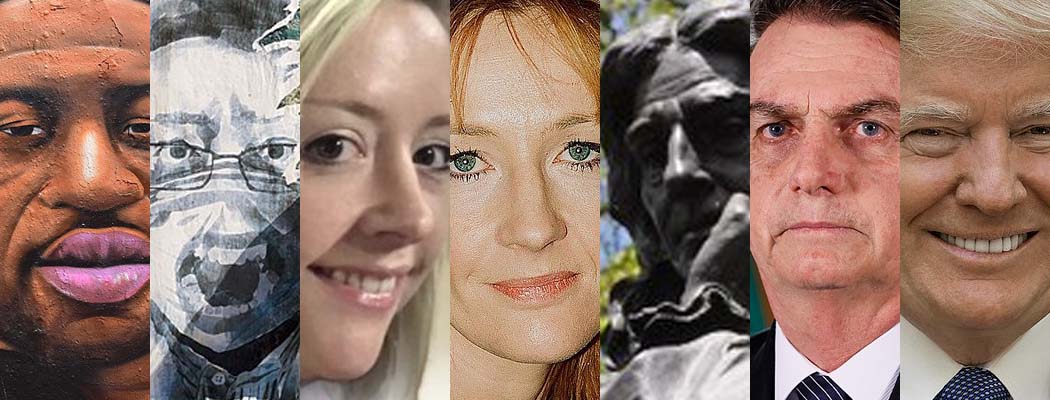George Floyd: what has changed one year on?
[vc_row][vc_column][vc_single_image image=”116812″ img_size=”full” add_caption=”yes”][vc_column_text]George Floyd was my dad. He was my brother and my cousin, and my boyfriend and my criminology professor, and my pastor. He was every black man that I love. His death represented the death of a million black men. Every death of a black man at the hands of injustice threatens black men everywhere.
If you’re reading this and you’re white, when was the last time you watched another white person die a violent death on your phone? I have watched more black men and women die on Twitter and Instagram than I can count on both hands. The careless tossing away of black lives, especially by those who are supposed to protect and serve, has turned into a monthly episode on social media.
We should not have to watch ourselves die over and over at the hands of the police. We should not be used to hearing “not guilty” when police are put on trial for our murders. We should not be used to finding out about police departments covering up gruesome murders at the hands of their police officers. We should not be used to grieving, but we are.
George Floyd’s death was not the first or the last gruesome murder of an innocent black man caught on tape. In 1961, the author James Baldwin said so poignantly, “To be a Negro in this country and to be relatively conscious is to be in a state of rage almost, almost all of the time.”
When I watched Floyd die, I watched my father die, I watched my brother die, I watched my cousin die, not for the first time, but the twentieth time. His death felt like another wave of grief and anger. That’s how it felt in 1961, and still feels today, to be a black person in America with any semblance of consciousness; it feels like a constant state of grief and anger that comes in waves.
George Floyd’s murder was a horrendous and disgusting show of the carelessness with which the police and society treat black bodies. What adds to the tragedy is that his story is not the first or last of its kind; I have friends and family members who have lost loved ones to the police, been injured by the police, or have lost quality of life because of the police, but their names were not placed after a hashtag because no one was there to record it.
For many black people, George Floyd’s murder and America’s response felt like a little too late awakening as we have been dealing with this treatment, specifically by the police, for generations. However, I am optimistic that those who fought for George Floyd will continue to fight with that same ferocity for our black brothers and sisters who are still alive.
Since last year, I have started to see a sense of urgency from the white majority to eradicate certain racist systems, which is amazing. However, it is important that black lives also matter even when it is not palatable and marketable for businesses and organisations.
Black lives matter when the victim is a criminal, or homeless, or disabled, or loud, or not nice. Black lives matter even when the victim is not crying out for his mother. Black lives matter even when there is no phone screen recording it.
Last year, I was proudly among one of the many applicants for law school; applications for college, law school, med schools, and other graduate schools were in record numbers in America, seemingly as a result of the number of systemic injustices we saw unfold. This fall, I will be beginning law school with an intent to work in prison, criminal justice, and broad human rights reform (which also are areas that are inherently racist in America).
Seeing the urgency of our youth to get involved in helping change the racist healthcare systems, racist criminal justice systems, racist public health systems, racist education systems has been refreshing and gives me hope that in generations to come, we will see changes in social thought leading to a more inclusive and empathetic society.
But the battle from last year is not over. The battle from 20 or 100 years ago is not over. In my opinion, police departments across America need to be uprooted and completely flipped on their heads to reveal to everyone the nasty racist history upon which they were created. Crime-control systems that focus on mental health resources, improving social interaction, creating job security and job opportunity, providing access to quality education, and creating community-led programming, etc. need to be implemented, as those are the aspects of society that actually decrease crime rates.
People must learn and listen to minority issues and treat others as they would like to be treated. Systems need to be created that do not benefit the white majority in a way that encourages indifference. Less than 5 per cent of lawyers are black, and less than 2 per cent are black women. Around 5 per cent of doctors are black; 7 per cent of teachers are black. There is a stark underrepresentation of black people in positions that affect some of the greatest changes in society. As more black and brown people are able to ascend to new heights in society, their influence will hopefully facilitate new changes in laws, practices, and social thought that can move us further away from systems of racism.
Moreover, the white majority have to share their platforms, listen to the needs of the minority, set aside their selfish and unilateral stances for the sake of advocating for those discriminated against. As those in power are mostly white men, we need their support and not their indifference. We need to continue making white people feel as uncomfortable about the racism that exists in America as we do so they too feel compelled to facilitate change.[/vc_column_text][/vc_column][/vc_row]

